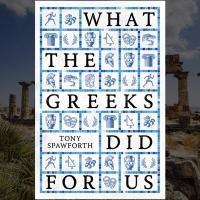'An exhaustive exposition of the ways in which the world has defined itself with regard to Greco-Roman antiquity would be nothing less than a comprehensive history of the world. So quotes Tony Spawforth in his new book, What the Greeks Did for Us. Luckily, and despite the title, such a broad and in-depth survey is not Spawforth's target here. Rather, it is a personal, subjective, and selective look at ancient Greece through the lens of modern culture; one man's expert opinion on what he thinks are some of the most important ways in which ancient Greece has had an impact on modernity – specifically, the present day. So, within its pages we find the usual suspects: medicine and science; poetry, plays, and expression; art and architecture. But we also obtain some surprising insights: the impact of Zeus on Christianity, for example, or the reminder that a certain public-schooled, former British prime minister aims to be a new Pericles. And then there are the contentious issues: sexism, sexuality and gender fluidity; slavery and colonialism; racism and eugenics. Given the heftiness of some of the topics, it is astounding that the book feels so gracefully agile.
So quotes Tony Spawforth in his new book, What the Greeks Did for Us. Luckily, and despite the title, such a broad and in-depth survey is not Spawforth's target here. Rather, it is a personal, subjective, and selective look at ancient Greece through the lens of modern culture; one man's expert opinion on what he thinks are some of the most important ways in which ancient Greece has had an impact on modernity – specifically, the present day. So, within its pages we find the usual suspects: medicine and science; poetry, plays, and expression; art and architecture. But we also obtain some surprising insights: the impact of Zeus on Christianity, for example, or the reminder that a certain public-schooled, former British prime minister aims to be a new Pericles. And then there are the contentious issues: sexism, sexuality and gender fluidity; slavery and colonialism; racism and eugenics. Given the heftiness of some of the topics, it is astounding that the book feels so gracefully agile.
Of course, What the Greeks Did for Us is not intended as an academic tome; instead, it is for the layman, without the ‘stuffy’, ivory-towered style that can go hand-in-hand with the subject. It is a Grecian island-hopping holiday, a jaunt under a bronze sky, visiting the best-known destinations but also some secluded bays that are fully off the beaten track. It is a refreshing and inspiring sojourn. And all the while, we are at the whim of our extremely knowledgeable tour guide who not only has all the facts to hand – and the language to converse with the locals – along with a lifetime's worth of engaging and witty anecdotes, but also a wide range of teaching aids to help explain his point, stretching from packed-out theatres through video games to a spam of websites.
Occasionally Spawforth apologizes for his meanderings; he appears a little surprised that the reader has made it to certain points in the book. Given how engaging and accessible both the book and his style seem, this might be compliment-seeking – in which case, I am loath to lavish any more (well-deserved) praise upon it. But perhaps there is something deeper at work here. After all, as Spawforth mentions, the ancient Greeks have not had an easy ride of it recently. At both secondary and higher levels of education, interest and uptake in the classics is falling. To some, the ancient Greeks and their Roman cousins seem irrelevant at best; at worst, exclusive and redolent of an age and culture best forgotten. What the Greeks Did for Us is by no means an apology for the classical world: the more disagreeable elements are considered in tandem with the highlights of democracy and artistic achievement to form a balanced whole. But there is an argument that we need to recognize the cultural legacy handed down to us by the ancient Greeks – no matter how much we rail against certain traits that we might find objectionable, they are still important. Rather like the keel of our metaphorical tour boat, they have helped to form the structure of today's society. Better to understand them – and their impact – in all their gory glory, than to rip them asunder and sink with what remains.
As such, What the Greeks Did for Us is a perfectly pitched cry for continuing recognition – and reassessment – of ancient Greek culture. Spawforth has shown that ancient Greece is, indeed, still topical. But he has also shown that it is timeless – or, rather, that it is for all time. Throughout the two-and-a-half millennia since the focus of this book, ancient Greece has been reimagined time and again to fit the prevailing needs of the day. Like Proteus, it can and does change shape. It is as relevant to our culture today as it has ever been.


